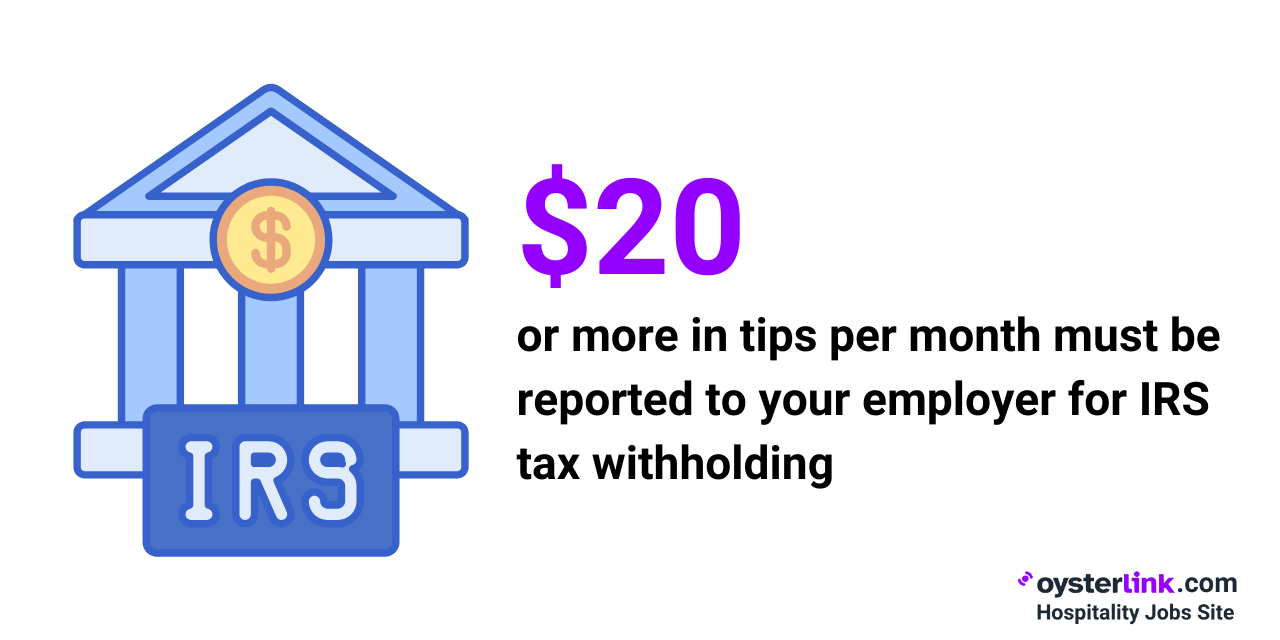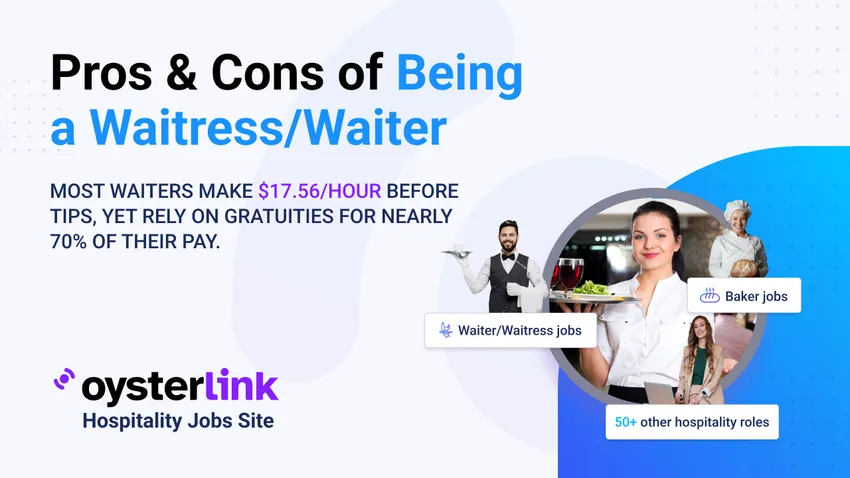Being a Waitress or Waiter means more than just serving food.
It’s a fast-moving job built on charm, patience, and endurance. In this article, we’ll break down the real pros and cons of life in the dining industry.
What Is a Waitress/Waiter Role in the Hospitality Industry?
Being a Waitress or Waiter means providing customer service in restaurants, cafés, or hotels. You take orders, serve food and drinks, and ensure guests have a great dining experience.
Pros of Being a Waitress/Waiter
Being a Waitress/Waiter has clear perks from earning good money quickly to starting without special training or education.
1. Potential to earn good money
In the U.S., Waiters and Waitresses earn an average base salary of $36,530 a year, or about $17.56 per hour before tips.
While wages are modest, tipping culture allows Servers to earn significantly more.
Source: Money
Tips often exceed base wages, making up about 69% of a Server’s income. Most customers tip 15–20%, though amounts can vary.
Curious where Servers earn the most? Check out our full guide to the top-paying restaurants in the U.S.
2. Honing people skills through social interactions
If you’re social, serving lets you meet new people daily and build lasting connections.
Beyond taking orders, you create memorable dining experiences while sharpening communication, adaptability, and EQ - skills valuable in any career.
Serving can also strengthen your mental resilience. You’ll learn to manage difficult customers and defuse conflicts before they escalate.
3. Networking opportunities
Being a Waiter or Waitress also opens the door to meaningful connections that can benefit your career long-term.
In tight-knit restaurant communities, these connections often translate into job leads, referrals, and valuable networking advantages.
4. Developing patience and multitasking skills
As a Server, you develop patience and the ability to stay calm under pressure - skills that shine in any customer-facing role.
Managing difficult guests and unexpected issues builds resilience, while balancing orders, refills, and table checks sharpens your prioritization.
5. Free or discounted meals
In most restaurants, waitstaff get a free meal once per day, or at least access to food at discounted rates.
Some restaurants even allow waitstaff to take food home after their shift is over. This allows them to save a significant amount of money.
6. Consistent daily schedule
Unless you have to deal with some unforeseen circumstances, your daily schedule will be rather consistent.
You'll have a set of daily duties you'll have to carry out. However, knowing what to expect during your shift can help reduce anxiety.
7. Lots of employment opportunities
The restaurant industry is thriving. There will always be jobs for eager applicants willing to work as a Server.
You’ll not only have steady job opportunities but also the flexibility to pick the restaurant that suits you best.
8. Career advancement in the hospitality industry
Starting as a Waiter/Waitress can be a stepping stone to a long-term career in hospitality.
Many restaurant professionals began as Servers, building on that experience to move up the ladder.
With dedication, you can progress into higher-paying jobs such as Restaurant Manager, or even branch into roles like Executive Chef.
If you see a future in the industry, seek out added responsibilities, learn from mentors, and focus on building leadership skills that set you apart.
Cons of Working as a Waitress/Waiter
Working as a Waiter/Waitress isn’t for everyone, especially if you’re not very sociable. The job often comes with difficult customers and night shifts.
1. Inconsistent earnings and financial uncertainty
Tip-based income can be rewarding, but it’s also unpredictable. Busy shifts often bring in strong earnings, while slow periods can cut income dramatically.
Tip pooling adds another layer. While it helps balance pay among staff, it can lower an individual’s take-home earnings.
2. Tax complications of tipped income
Another challenge with tips is that they count as taxable income, and employees are required to report them.
Since many tips are received in cash, tracking everything is tricky. Some Servers underestimate their taxes, which can lead to unpleasant surprises at tax time.

Key points to remember:
- The IRS requires employees to report all tips of $20 or more per month to their employer.
- Tips are subject to federal and state income tax, as well as Social Security and Medicare taxes.
- Failing to report tip income accurately can result in IRS penalties.
3. Working on weekends and holidays
While most people spend weekends and holidays relaxing or dining out, waitstaff are usually on the clock.
These shifts are often the busiest, making it tough to maintain a healthy work-life balance.
The upside is that weekends and holidays can bring in more tips, giving servers the chance to boost their earnings during peak times.
4. Dealing with difficult customers
Difficult customers can make serving one of the most stressful jobs, especially in restaurants or bars that serve alcohol.
To prepare staff, many establishments require Responsible Alcohol Service training, which teaches strategies for handling difficult customers.
5. Physically demanding
Waitstaff spend long hours on their feet, constantly moving and handling physically demanding tasks such as lifting trays and clearing tables.
Although stamina improves with experience, avoiding burnout requires care - good footwear, regular stretching, and staying hydrated are a must.
6. Not a lot of extra benefits
Most restaurants offer few extra benefits to Servers. Aside from an hourly wage, tips, and sometimes discounted meals, that’s usually all you get.
Health and dental insurance are often your own responsibility, and many employers don’t provide sick leave or paid time off.
This makes it harder to take a break or visit a doctor when you know the costs will come directly out of your pocket.
Waiter Income and Earning Potential
Waiters and Waitresses earn an average base salary of $36,530 per year in the U.S., or roughly $17.56 per hour, according to the Bureau of Labor Statistics.
However, tips make up about 69% of total income, with most customers tipping 15–20%. That means Servers working in busy or upscale venues can earn significantly more.
Waitress Career Opportunities and Growth
Many hospitality professionals start out as Waiters or Waitresses before moving up to higher-paying roles such as Head Server, Restaurant Manager, Sommelier, or Beverage Director.
With strong communication, leadership, and customer service skills, you can transition into hotel management, event coordination, or fine dining.
Conclusion: Is Being a Waitress/Waiter Worth It?
Being a Waitress or Waiter in 2025 offers flexibility, human connection, and strong earning potential—but it also comes with unpredictable schedules and physically demanding shifts.
For those who enjoy fast-paced environments and people-oriented work, it can be both a rewarding and practical career path.
With the right mindset, patience, and communication skills, this role can open doors to long-term success in hospitality.









Loading comments...